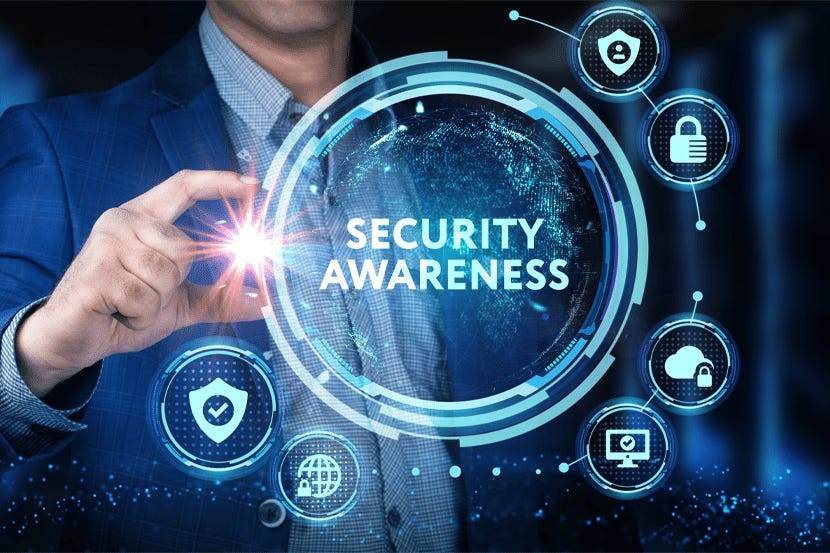SECURITY AWARENESS TRAINING

What is Security Awareness Training?
Security Awareness Training is an educational program designed to equip individuals with the knowledge and skills they need to identify and avoid cyber threats. It plays a vital role in an organization’s overall cybersecurity strategy by empowering employees to become active participants in protecting sensitive data and systems.
Why it is important getting trained in Security Awareness Training?
Reduced Risk of Cyberattacks:
- Human Error: Many cyberattacks succeed due to human error, like clicking malicious links or falling for phishing scams. Security awareness training educates employees on common threats and best practices to avoid these mistakes, significantly reducing the risk of successful cyberattacks.
- Stronger Defense: A security-aware workforce is a vital line of defense against cyber threats. Trained employees can identify suspicious activity, report security incidents promptly, and follow security protocols, minimizing potential damage.
Improved Overall Security Posture:
- Heightened Awareness: Training raises awareness of cybersecurity threats and best practices across the organization. This fosters a culture of security where everyone understands their role in protecting sensitive information and systems.
- Alignment with Security Policies: Training ensures employees understand and comply with the organization’s security policies. This reduces the risk of policy violations that could create security vulnerabilities.
Compliance with Regulations:
- Data Privacy Laws: Many data privacy regulations, like GDPR and HIPAA, require organizations to provide security awareness training to employees. Training helps organizations meet these compliance requirements and avoid potential fines or penalties.
Enhanced Productivity and Cost Savings:
- Fewer Security Incidents: By reducing the risk of successful cyberattacks, security awareness training can save organizations significant financial losses associated with data breaches, system downtime, and recovery efforts.
- Improved Decision-Making: Training empowers employees to make informed decisions regarding cybersecurity. This can prevent costly mistakes like downloading unauthorized software or sharing sensitive data carelessly.
Benefits Beyond Technical Skills:
- Phishing Identification: Training equips employees to identify phishing emails, smishing attempts, and other social engineering tactics used by attackers.
- Password Management: Employees learn best practices for creating strong passwords, using multi-factor authentication, and avoiding password reuse, significantly improving overall account security.
- Physical Security Awareness: Training can cover physical security measures as well, reminding employees to be cautious about tailgating, keeping sensitive documents secure, and reporting suspicious activity around physical infrastructure.
Continuous Learning:
- Evolving Threats: The cybersecurity landscape constantly evolves, with new threats emerging all the time. Security awareness training emphasizes the importance of continuous learning, encouraging employees to stay updated on the latest threats and best practices.
In conclusion, security awareness training is an essential investment for organizations of all sizes. By educating employees on cybersecurity threats and best practices, organizations can significantly reduce their cyber risk, improve their overall security posture, and ensure compliance with relevant regulations. It’s a cost-effective way to empower your workforce and build a strong line of defense against cyberattacks.


Why it is important getting trained in Security Awareness Training?
Reduced Risk of Cyberattacks:
- Human Error: Many cyberattacks succeed due to human error, like clicking malicious links or falling for phishing scams. Security awareness training educates employees on common threats and best practices to avoid these mistakes, significantly reducing the risk of successful cyberattacks.
- Stronger Defense: A security-aware workforce is a vital line of defense against cyber threats. Trained employees can identify suspicious activity, report security incidents promptly, and follow security protocols, minimizing potential damage.
Improved Overall Security Posture:
- Heightened Awareness: Training raises awareness of cybersecurity threats and best practices across the organization. This fosters a culture of security where everyone understands their role in protecting sensitive information and systems.
- Alignment with Security Policies: Training ensures employees understand and comply with the organization’s security policies. This reduces the risk of policy violations that could create security vulnerabilities.
Compliance with Regulations:
- Data Privacy Laws: Many data privacy regulations, like GDPR and HIPAA, require organizations to provide security awareness training to employees. Training helps organizations meet these compliance requirements and avoid potential fines or penalties.
Enhanced Productivity and Cost Savings:
- Fewer Security Incidents: By reducing the risk of successful cyberattacks, security awareness training can save organizations significant financial losses associated with data breaches, system downtime, and recovery efforts.
- Improved Decision-Making: Training empowers employees to make informed decisions regarding cybersecurity. This can prevent costly mistakes like downloading unauthorized software or sharing sensitive data carelessly.
Benefits Beyond Technical Skills:
- Phishing Identification: Training equips employees to identify phishing emails, smishing attempts, and other social engineering tactics used by attackers.
- Password Management: Employees learn best practices for creating strong passwords, using multi-factor authentication, and avoiding password reuse, significantly improving overall account security.
- Physical Security Awareness: Training can cover physical security measures as well, reminding employees to be cautious about tailgating, keeping sensitive documents secure, and reporting suspicious activity around physical infrastructure.
Continuous Learning:
- Evolving Threats: The cybersecurity landscape constantly evolves, with new threats emerging all the time. Security awareness training emphasizes the importance of continuous learning, encouraging employees to stay updated on the latest threats and best practices.
In conclusion, security awareness training is an essential investment for organizations of all sizes. By educating employees on cybersecurity threats and best practices, organizations can significantly reduce their cyber risk, improve their overall security posture, and ensure compliance with relevant regulations. It’s a cost-effective way to empower your workforce and build a strong line of defense against cyberattacks.








